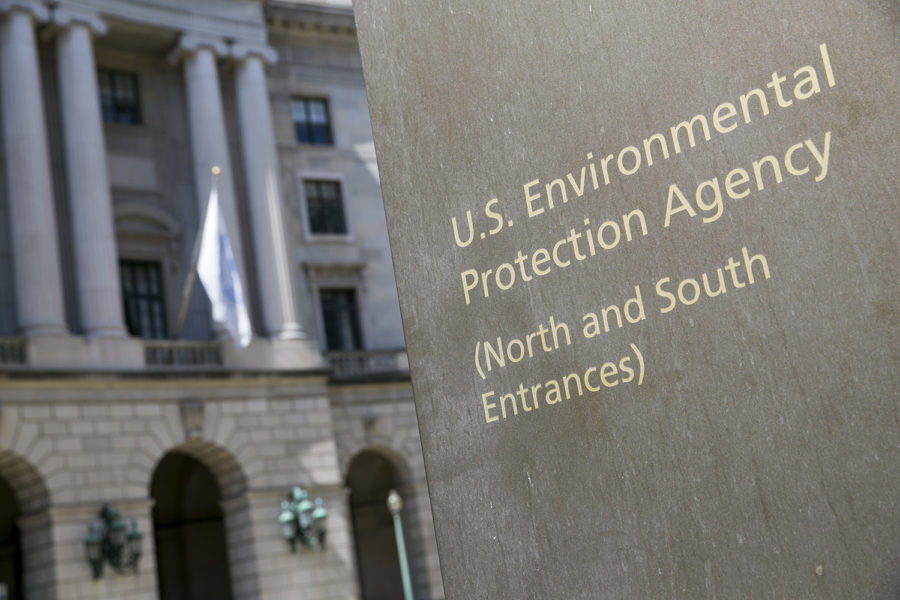At Trump’s EPA, going to work can be an act of defiance
A logo sign outside of the headquarters of the United States Environmental Protection Agency on April 2, 2017 in downtown Washington, D.C. (Kristoffer Tripplaar/Sipa USA/TNS)
April 6, 2017
As California’s top energy regulator, Michael Picker has an absurdly busy job. So it was a little surprising to find him recently near a Washington, D.C., metro stop, randomly handing out help-wanted fliers in the middle of a workday.
But with morale plummeting at the Environmental Protection Agency since President Donald Trump took office, Picker saw in that patch of sidewalk near its headquarters an opportunity — and perhaps a publicity stunt — to lure top-shelf talent that never before would have considered bolting from the agency.
The dim outlook at the EPA is weighing heavily on its 15,000 scientists, engineers, investigators and other employees, many of whom perceive their life’s work to be under assault from within. The Trump administration is moving as quickly as it can to diminish the place, with plans to cripple the EPA science office, stop the agency’s climate change work, cut its Superfund program in half and outright eliminate 50 programs, down to the voluntary Energy Star stickers that help consumers locate efficient appliances.
Advertisement
It all has Jared Blumenfeld’s phone ringing off the hook. “The number one call I get everyday is, ‘Jared, can you help us find work somewhere else,'” said Blumenfeld, who ran the regional office of the EPA encompassing California, Nevada and Arizona until last May.
His advice? Don’t quit, fight. “I try to tell people that staying and doing your job at this point in history is an act of resistance, that if they leave, we will wind up with gaps in the system.”
That message is not always well received from employees now working for an administration that has openly accused the agency of producing junk science, pursuing a political agenda and abusing its authority.
“It is very hard to be here right now,” said a senior EPA official who has been with the agency for 30 years. The Trump administration is “battling with basic scientific facts. … There might have been slow progress on things like climate change under Bush-Cheney, but this is outright turning things over completely on their head. I have never seen anything like it.”
Agency scientists watched in dismay last week as EPA Administrator Scott Pruitt rejected their finding that a pesticide called chlorpyrifos must be removed from the market because exposure to high doses could inhibit the brain development of children. The day before, Trump was at agency headquarters to pillory its yearslong work on climate change and sign an order killing the signature global warming programs that agency employees had invested tens of thousands of hours developing.
On Capitol Hill, the House was passing a law that doctors and public health officials warn would cut EPA scientists off from medical data they need to protect the public from toxic pollutants. Climate skeptics from far outside the scientific mainstream dominated the witness panel at a House committee hearing the same day, during which they encouraged lawmakers to assemble teams of researchers within the federal government whose job would be to raise doubts about the scientific consensus on global warming.
Even Bill Ruckelshaus, who was appointed by Richard Nixon to be the first EPA chief and then recruited by Ronald Reagan to restore it when the public grew angry that clean air and water were slipping away on Reagan’s watch, said he had never seen anything like the tumult the agency faced now.
Advertisement*
“It is going to set us back in ways we can’t even predict,” he said. Ruckelshaus is among those beseeching longtime employees to ride out the chaos.
“My advice is easy to give and hard to take,” said Ruckelshaus, who worries the important government work of those experts decamping to the less stressful environs of academia, nonprofits or even state government will just stop. “Hang in there.”
The concerns of old-timers extend far beyond the climate work under attack. Even in the best of times, Blumenfeld said, staffing the teams that do specialized work like detect radioactive fallout or respond to oil refinery explosions can be exceedingly tough. Now people in key positions, he said, are packing up at the same time the administration is looking to shrink its workforce by 3,000, and there is no guarantee any job will be filled.
Under Trump’s budget blueprint, the EPA took the biggest hit, losing nearly a third of its funding.
Among those who quit the agency recently was Mustafa Ali, who launched the EPA’s Office of Environmental Justice in 1992 and has served under Democratic and Republican administrations. Trump is proposing to eliminate that office altogether. “Some of the actions going on now are mind-boggling,” Ali said.
Legions of data wizards and archivists have joined an independent effort to preserve what they can of the work produced by the agency in recent years. They worry it will be erased. The nonprofit Environmental Data and Governance Initiative is holding events across the country where coders are working to save every byte of scientific data they can. The group is also tracking changes on the EPA’s website, where it was among the first to discover the word “science” had been removed from the mission statement of the agency’s Office of Science and Technology Policy.
___
(c)2017 Tribune Co.
Visit Tribune Co. at www.latimes.com
Distributed by Tribune Content Agency, LLC.
Advertisement








